Urban Kiwis and Farmers Share a Vision for Sustainable Food Production
A survey into attitudes towards food production after visiting a farm shows that urban Kiwis and farmers share a similar vision of sustainable farming. Urban farm visitors see direct-to-farmer food purchasing as their most impactful sustainable action.
On 21 March 2021, New Zealand’s second annual Open Farms day welcomed more than 2700 Kiwis onto 37 farms across the country. Designed to reconnect Kiwis with New Zealand’s land, food and farmers, the event enabled the Our Land and Water National Science Challenge (an event sponsor) to conduct a survey into attitudes towards food and fibre production.
In addition to validating the 2020 research findings that on-farm experiences build farmer-citizen connection and change people’s perceptions of farming, the 2021 research adds five key research insights to the story.
1. A shared vision of sustainable farming
Urban visitors and host farmers share a similar vision of sustainable farming. Urban visitors see direct-to-farmer food purchasing as their most impactful sustainable action.
Urban visitors and host farmers generally share a vision of more diverse landscapes, fewer chemical inputs, and farming practices that improve soil and water health.
Urban visitors expressed a preference for more natural approaches to farming – ranking ‘regenerative practices’, ‘reducing inputs’ and ‘diversity’ as their top three sustainable farming practices. Host farmers rated ‘diversity’ and ‘farm environment plans’ as their top two sustainability practices, followed by a third tier including ‘regenerative practices’, ‘reducing inputs’ and ‘higher-value end products’.
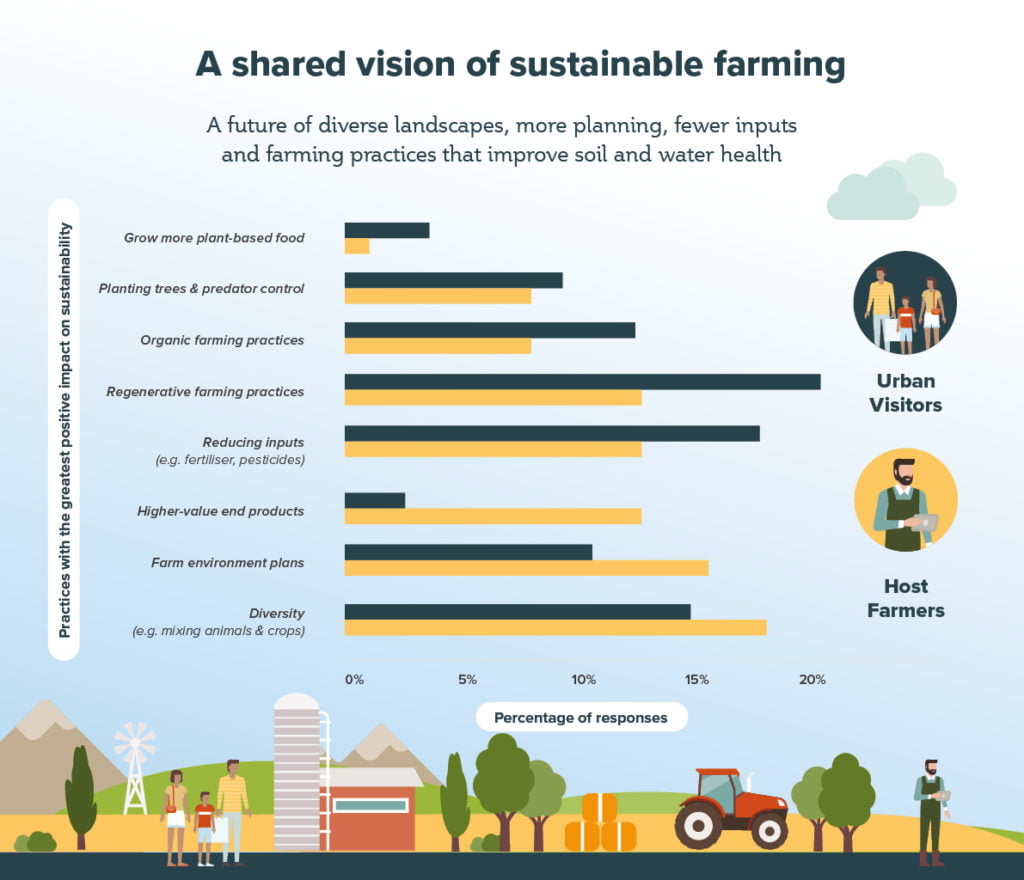
During phone interviews, urban visitors explained sustainable and regenerative agriculture by grouping multiple farming practices together. These included: looking after the soil, a focus on the future, working within natural constraints and cycles, and reduced inputs.
Urban visitors also connected ideas of local food production/consumption and biodiversity restoration to the sustainable farming story.
For some, visiting a farm helped them articulate what these sustainable farming practices look like in practice.
Urban visitors and host farmers share a similar vision of sustainable farming. Urban visitors see direct-to-farmer food purchasing as their most impactful sustainable action.
Farm visitor comments
“I found the farm we visited was very sustainable. Really showed us how better farming could be done.”
“[More sustainable farming includes] protecting the native vegetation – we saw an example of that in the farm we visited. They had restored a lot of native bush.”
Researcher’s insight
“These findings support those of a Ministry for Primary Industries survey of rural and urban dwellers attitudes and beliefs about farming in New Zealand. That 2017 survey found that the ‘divide’ between urban and rural populations may not be as big as some media reports indicate, instead showing few differences between urban and rural attitudes and views, and agreement that water pollution and quality is the most significant environmental issue facing New Zealand. What is potentially new about the Open Farms survey is the finding that urban and rural dwellers have a shared vision for sustainable farming – so they don’t just agree on the issues, but also on the solutions.” – Dr James Turner, Our Land and Water science leader and AgResearch senior scientist.
2. Barriers to the vision
Host farmers and urban visitors agree that the biggest barrier to sustainable farming is the purchasing and pricing power of large market players, like supermarkets.
Respondents expressed a fairly nuanced understanding of food systems issues, highlighting how consumer demand can drive unsustainable practices.
When asked to reflect on the role of large market players, like supermarkets, many respondents felt that their power over both farmers and customers was limiting positive change in the food system.
This was balanced by recognition that supermarkets were responsive to consumers too – but some wondered whether they respond to perceived rather than actual demand.
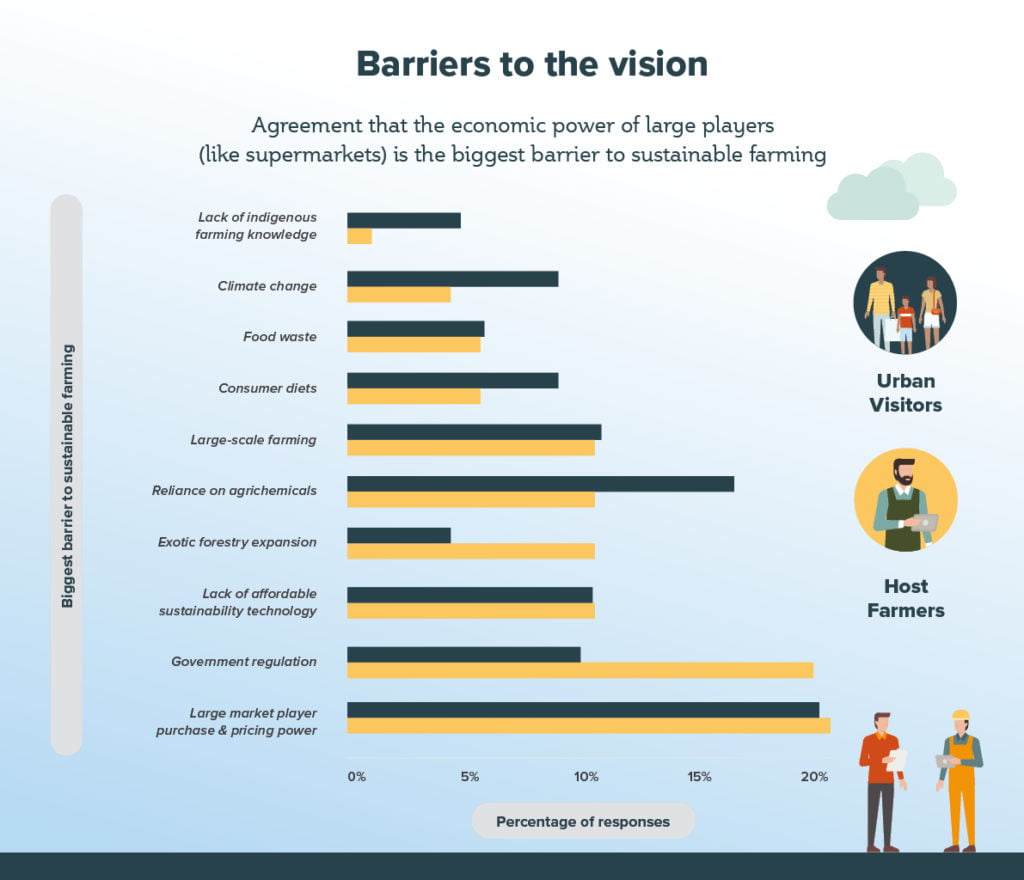
Farm visitor comments
“There is a consumer expectation for more produce and more production – this has encouraged farmers to add more chemicals and more intensive farming – this puts pressure on natural resources. It also encourages farmers to move further away from sustainable practices.”
“People value cost over sustainability. It is cheaper meat, but people don’t understand the knock-on consequences of what that means. If you pay a bit more you are allowing the producer to take time and care with their practices. Demand for cheap product and goods fuels a lack of sustainable practices.”
“The supermarkets sell what they think consumers want to buy, the feedback loop is broken.”
“We have a supermarket duopoly – they do set prices and if you can’t compete with their prices, then you are out of the market. It would be nice to see more competition and more choice with food purchasing.”
Researcher’s insight
“This focus on the role of large market players reflects recent findings from the Australian Competition and Commerce Commission that ‘in most perishable agricultural goods markets, there are many farmers, but few processors or wholesalers, and even fewer major retailers. This makes farmers particularly vulnerable to issues stemming from limited competition at the wholesale or retail level. In addition, the more perishable a product is, the weaker the farmer’s bargaining power often is'. This concern regarding retailer power and a focus on cost reduction and consistency has been found overseas, e.g. in the UK by Menary, Collier and Seers.” – Dr James Turner, Our Land and Water science leader and AgResearch senior scientist
3. Price: The elephant in the room
While some urban visitors are willing to pay more for sustainably grown food, most think food in New Zealand is too expensive as it is. Despite respondent concern for the perceived low prices farmers receive for their produce, price increases for food were not recognised as a likely pathway towards sustainable farming.
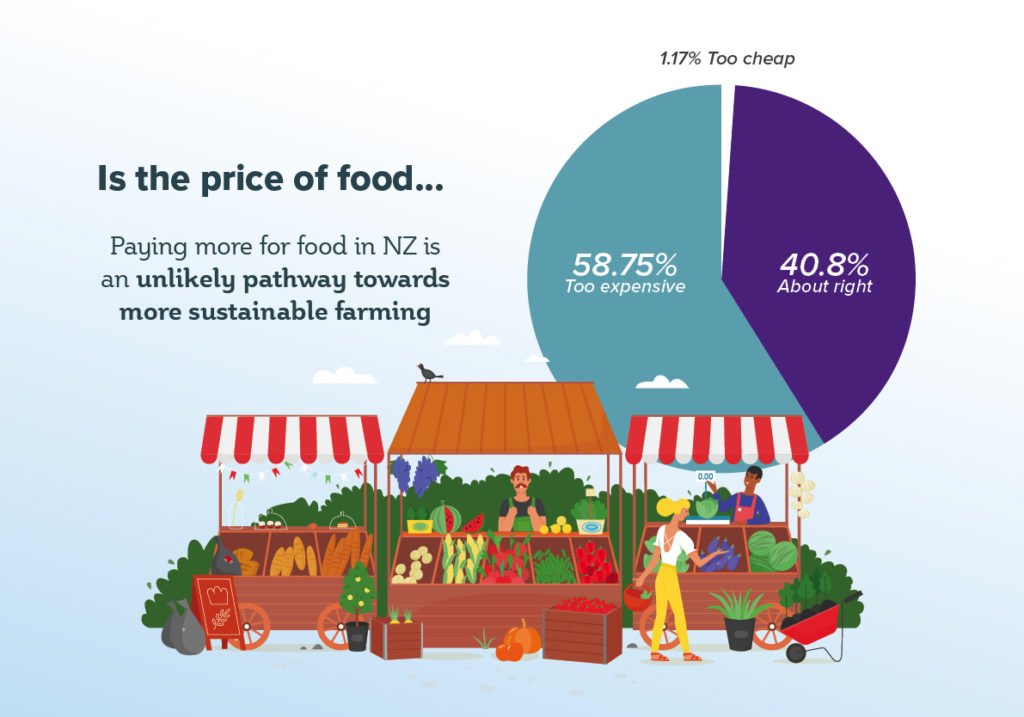
Farm visitor comments
“We are middle income, but basic wage people cannot afford fruit and veg.”
“What do the growers and farmers get back from that price?!”
“There is a big difference to what the farmer gets in their pocket compared to what we pay in the supermarket.”
Researcher’s insight
“Urban dwellers may see food as too expensive due to the view that fresh food prices are already high in New Zealand. In the past few years, food prices have been rising faster than the rate of general inflation. Statistics NZ’s Food Price Index shows fruit and vegetable prices increased 8.9 percent last year, while general inflation sat at 1.4 percent. Earlier research has suggested that consumers are willing to pay more for sustainably grown food. For example, findings of a 2008 study indicated that New Zealand consumers have a strong demand for wine that is produced sustainably, and they are prepared to pay a higher price for this wine.” – Dr James Turner, Our Land and Water science leader and AgResearch senior scientist
4. The way forward: Food direct from the farmer
Urban visitors believe supporting local farmers directly is the most effective food sustainability action they can take.
Qualitative interview respondents described buying direct as the “best way to support farms” and associated quality and community benefits with the practice.
When asked about the barriers to buying food direct from farmers, respondents cited logistics over price – suggesting the mix of farmers’ markets, online direct sales, roadside stalls/small farm stores and small stores was complicated and time-consuming.
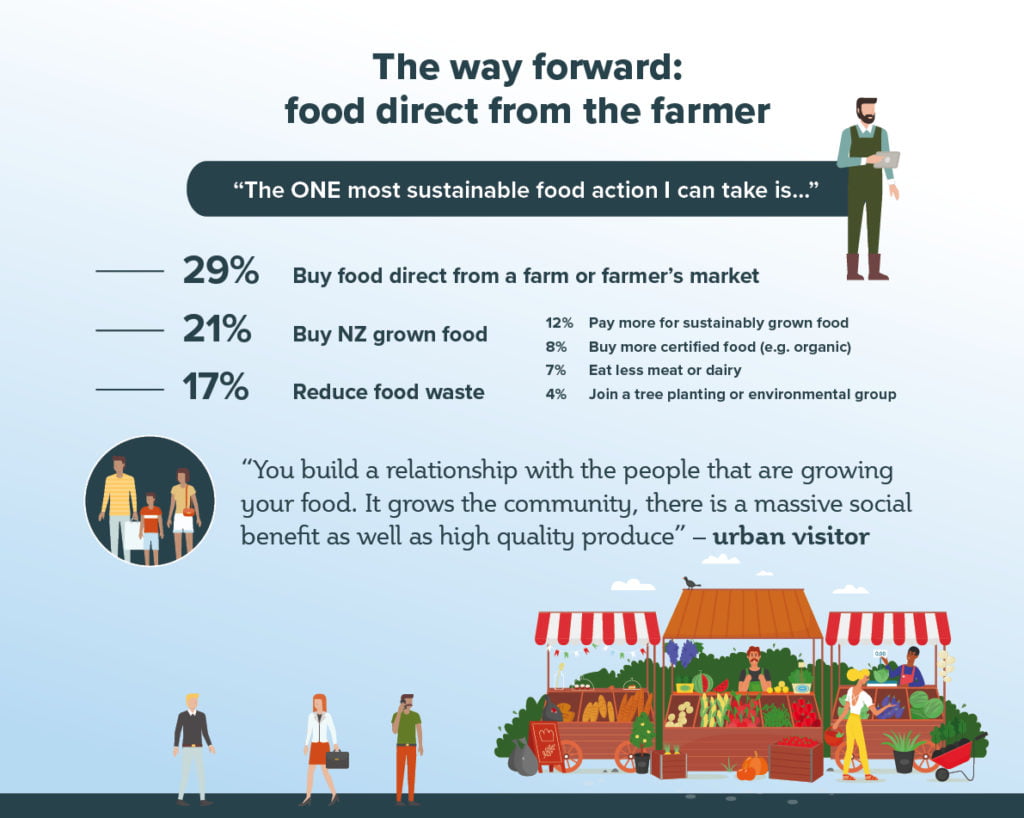
Farm visitor comments
“I feel that we are always getting a fresh item when we buy direct from farmers.”
“If I had an easy opportunity to buy direct from farmers, I would do it. It is difficult when you live in a big city.”
“Sign me up – where can I do it? We buy fruit and veg from the farmers market. If I had the option, I would buy meat and other products online direct from farmers. Accessibility is hindering this function, it would be awesome to have a central online portal to find farmers to buy direct from.”
“You build a relationship with the people that are growing your food. It grows the community, there is a massive social benefit as well as high quality produce.”
Researcher’s insight
“This highlights research overseas that consumers are motivated to buy direct from producers to contribute directly to farmers' income, and to support farmers providing environmental benefits. This is an opportunity for farmers to be supported in their sustainable farming, while recognising that selling direct to consumers is currently challenging because our food system is set up for mass production and selling via the big retailers.” – Dr James Turner, Our Land and Water science leader and AgResearch senior scientist
5. Open Farm days connect people together
Visiting a farm builds connection between those who grow, and those who eat food. The experience positively changes how people view on-farm sustainability and encourages more considered food purchasing behaviour, like paying more for sustainably grown food or buying direct from farmers. These 2021 survey results validate the findings from the first Open Farms Day, held in 2020.
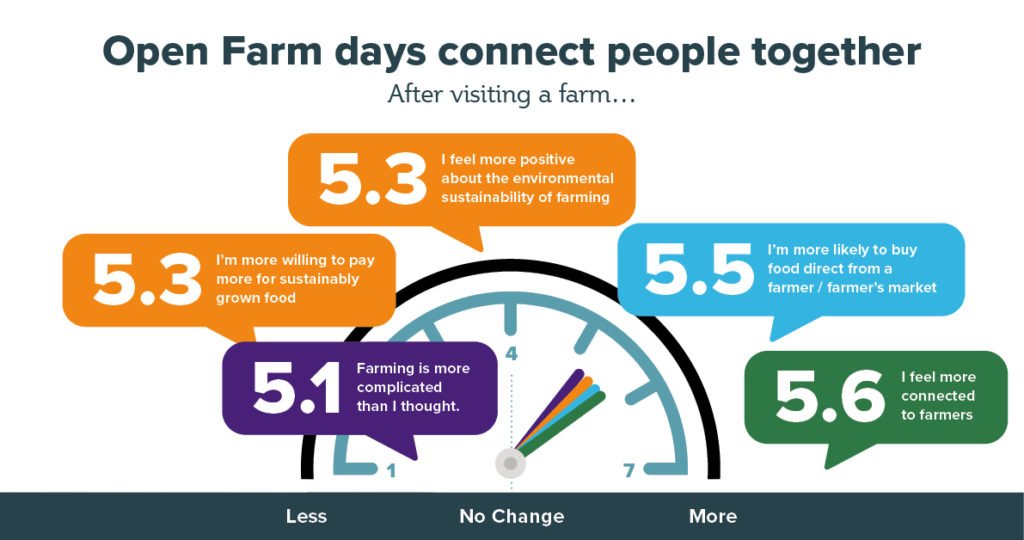
Farm visitor comment
“What an amazing opportunity for someone as green as me to see what can be done in an environment so close to my property. I thoroughly enjoyed it and really appreciate the time and care taken to show us around.”
Researcher’s insight
“This is interesting as it suggests visiting a farm is helping to address rural concerns that urban dwellers don’t understand the importance of rural and farming New Zealand. In the Ministry for Primary Industries 2017 survey of rural and urban dwellers attitudes and beliefs about farming in New Zealand, just 14% of rural respondents felt urban dwellers understood the importance of rural New Zealand.” – Dr James Turner, Our Land and Water science leader and AgResearch senior scientist
Supplementary Insights
Two other research insights indirectly support the theme of farmer-citizen connection as the preferred pathway to sustainable farming:
Farmers and customers have the power to influence
When asked which groups could have the most influence on sustainable farming, urban visitors cited themselves (end customers) and farmers. Farmers agreed that these groups were important, and also identified scientists and primary sector bodies as groups with high potential for positive impact.
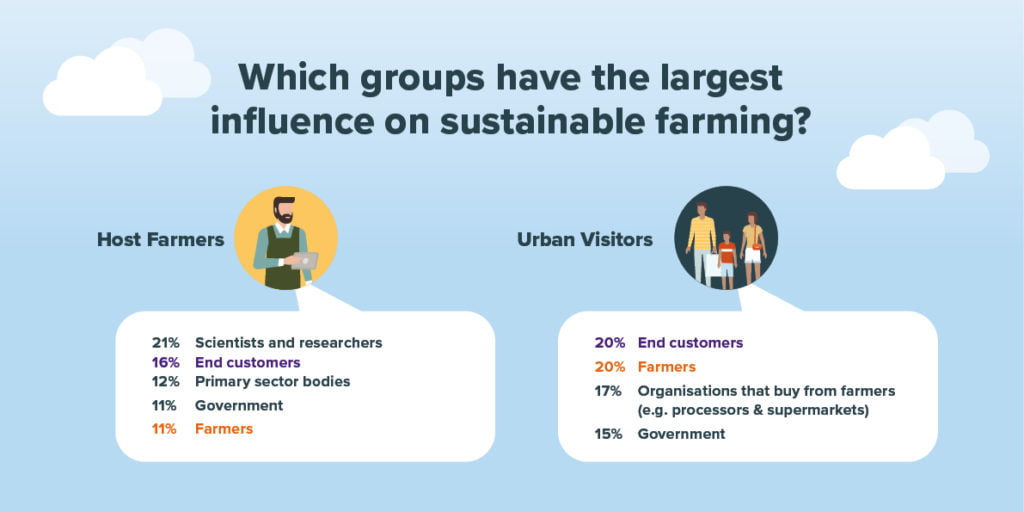
Farmers are trusted sources of sustainable farming information
When urban visitors and host farmers go looking for credible information about sustainable food choices, they both go to farmers, followed by scientists. This suggests a significant opportunity for farmers to build on this trust and construct food and farming narratives for urban visitors – and other farmers.
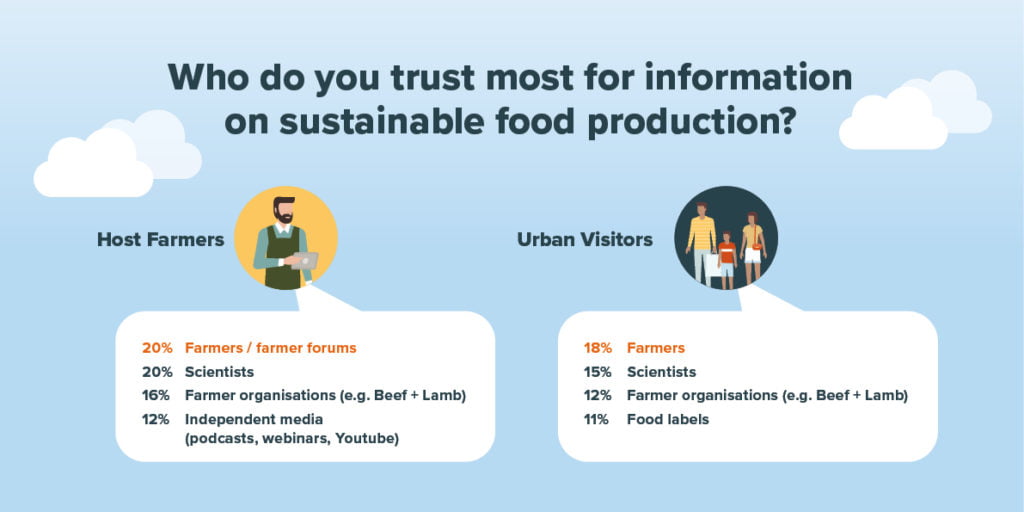
Insights of Interest
Two final insights are not directly connected to the main narrative of farmer-citizen connection as the preferred pathway to sustainable farming, but are of interest to the agricultural sector:
Te Taiao awareness lacking
Despite the well-publicised launch of the ‘Fit for a Better World’ strategy and the popular Te Papa exhibition, urban visitor and host farmer understanding of Te Taiao is generally low.
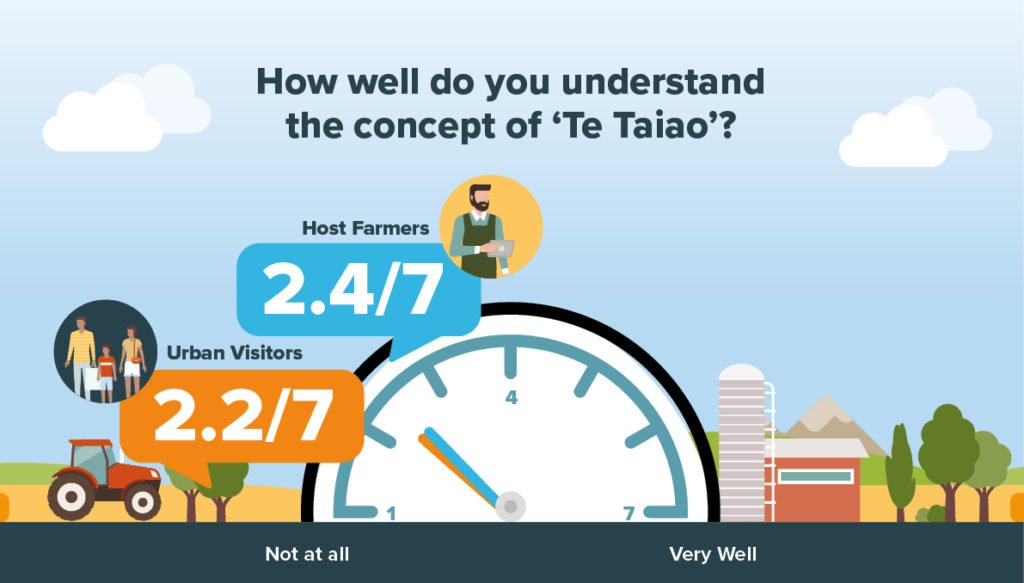
Experiencing farming can spark interest in a farming career
While almost half of urban visitors recorded ‘no change’ in their interest in a farming career following their on-farm experience, the other half recorded an even split between less and more interest. The fact that a quarter of urban visitors recorded more interest in a farming career following their on-farm experience, suggests Open Farms and similar projects may be an opportunity for industry recruitment efforts.
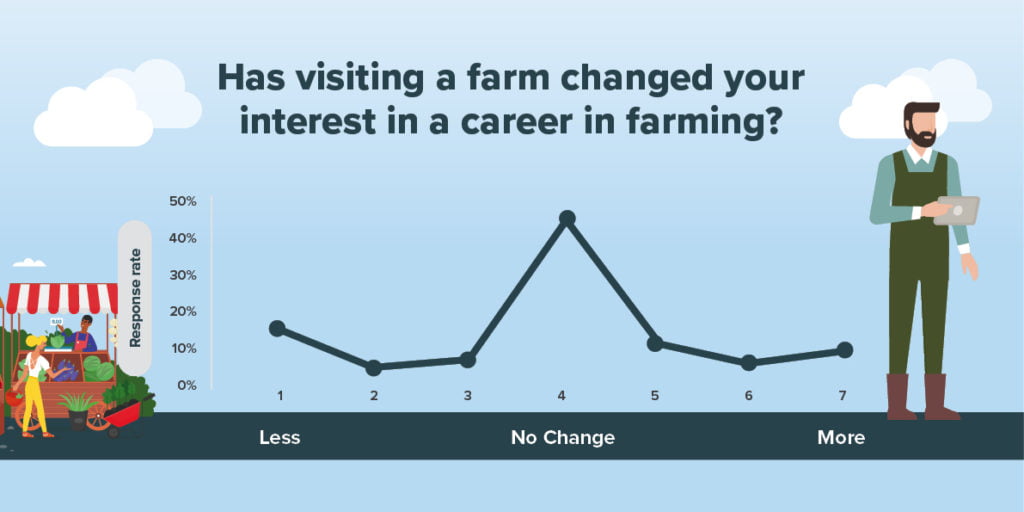
Farm visitor comments
“I just am so thankful for the opportunity for us to visit a farm and the people who run it. The folks at the farm were truly lovely. My children have been talking about wanting to become farmers when they get older, and they've included aspects of our visit in their latest imaginative play when I eavesdrop.”
“The BEST feedback was around a young person being inspired to study maths/science to then go on to work in the horticulture industry – that, for us, is a complete win!”
More information:
- Download infographics
- Dr James Turner is available for interview about these results
- The findings were compiled from an Open Farms visitor survey following the 2021 event, with 263 respondents (of which 83% lived in an urban setting), a host farmer survey (25 respondents) and qualitative phone interviews. We thank Roxanne Henwood (AgResearch) for her work designing, implementing and analysing the survey and interviews
- Open Farms is a platform to reconnect Kiwis with the people and places that grow our food. It’s a grassroots, nationwide initiative encouraging farmers from all sectors to host Open Farm day experiences. The platform provides farmers with event guidance, visitor marketing and registration support and connects visitors to Open Farm days via a booking system. The platform is independently run, with 2021 sponsor support from Beef + Lamb New Zealand, the Our Land and Water National Science Challenge and the Ministry for Primary Industries’ Sustainable Food & Fibre Futures fund
- Previous event: 2020 Open Farms survey results
Author
 View Our Strategy Document 2019 – 2024
View Our Strategy Document 2019 – 2024



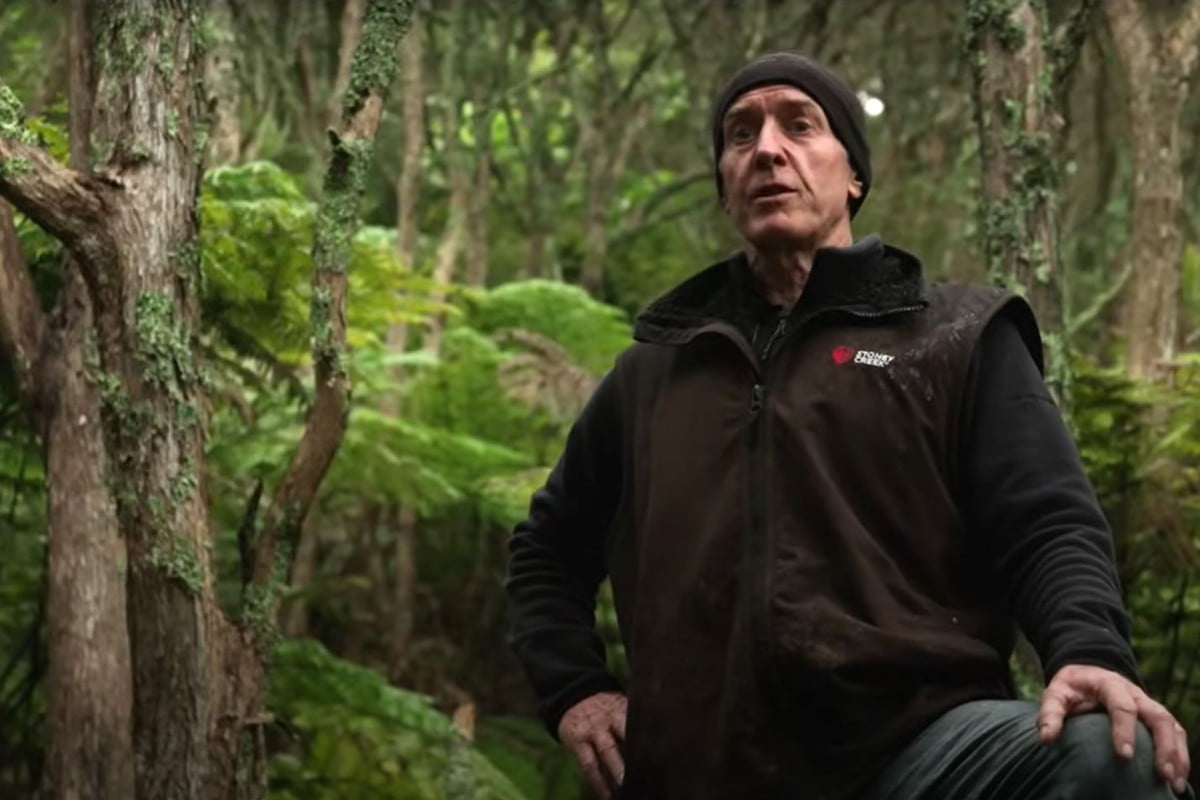
Leave a Reply